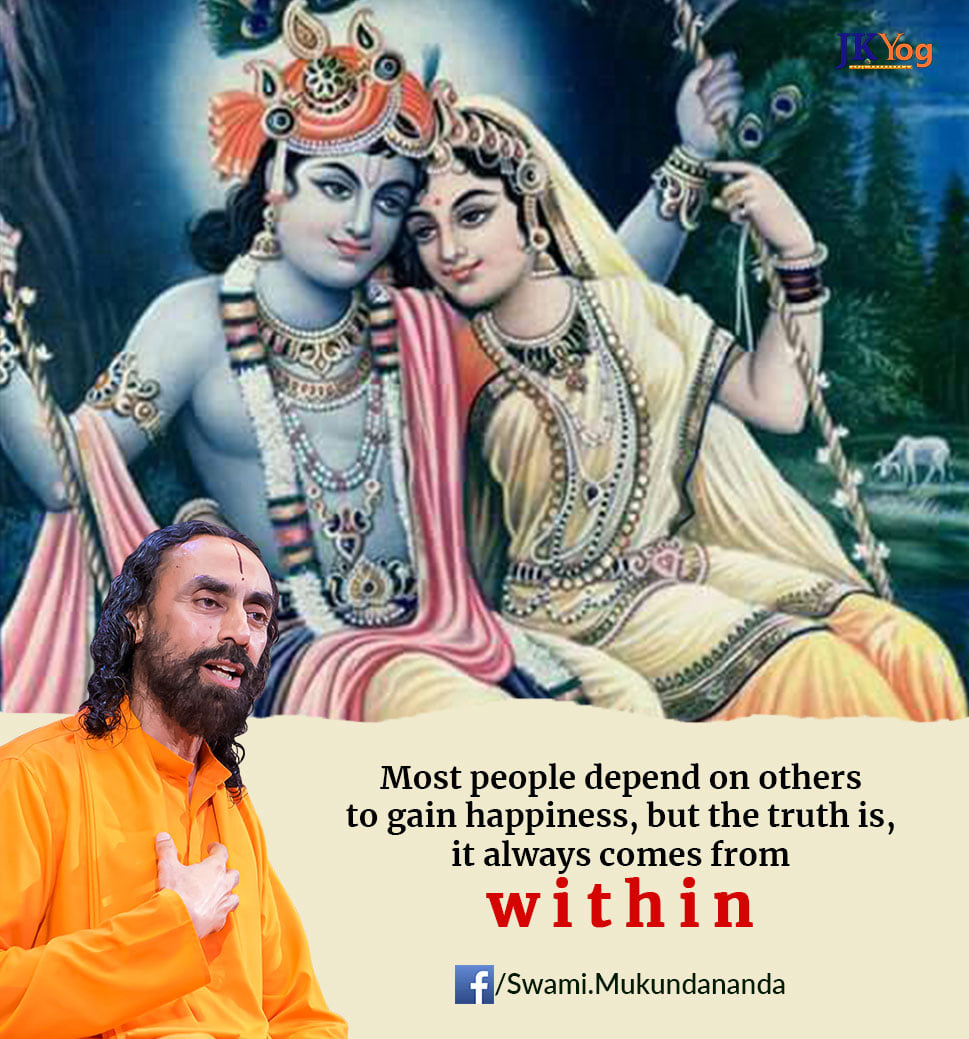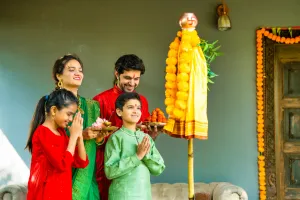Welcome to the December 2023 issue!

Welcome to the December 2023 issue!
 Quote
Quote
यत्तदग्रे विषमिव परिणामेऽमृतोपमम् |
तत्सुखं सात्विकं प्रोक्तमात्मबुद्धिप्रसादजम् ||
yat tad agre visham iva pariname mritopamam |
tat sukham sattvikam proktam atma-buddhi-prasada-jam ||
“That which seems like poison at first, but tastes like nectar in the end, is said to be happiness in the mode of goodness. It is generated by the pure intellect that is situated in self-knowledge.”
 From the Editor's Desk
From the Editor's DeskAll of us are aware that nothing much changes on New Year’s Day except our calendar. Yet, as the current year comes to an end, we naturally reflect and introspect on our progress in life, particularly spiritual progress. It’s because the end of the year is a juncture at which we pause and make resolutions to grow and progress based on our values and goals. This kind of self-reflection always helps us discover what we hope to change to be truly happy. We do this each year in the hope of cultivating new habits, new plans for the application of steps to meet our goals and a new attitude or mindset to succeed in our endeavor.
What is the right perspective to be truly happy from within? Read this issue to know more about mastering the art of happiness.
 Bhakti Ras
Bhakti RasMastering the Art of Happiness
For eons, we souls have been on a quest for true happiness – one that lasts forever and satiates the heart. This is because yearning for happiness is intrinsic to the nature of the soul. It springs from the fact that we are tiny fragments of God, who is an ocean of bliss. The Vedic scriptures repeatedly describe God as an ocean of unlimited divine bliss. Specifically, Taittiriya Upanishad states:
आनन्दो ब्रह्मेति व्यजानात्
Anando brahmeti vyajanat
“Know God to be bliss.”
If we have been on this eternal quest, and everything we do is in search of that bliss, what is the reason that no amount of material achievement or attainment satiates us? Why is it that regardless of the moments of happiness we experience, when we discern a higher state of happiness, the feeling of unfulfillment and discontentment lingers?
The Vedas refer to happiness in the mode of goodness as shreya, which is unpleasant in the present but ultimately beneficial. In contrast to this is preya, which is pleasant in the beginning but ultimately harmful. Regarding shreya and preya, the Kathopanishad states:
अन्यच्छ्रेयोऽन्यदुतैव प्रेयस्ते उभे नानार्थे पुरुषंसिनीतः |
तयोः श्रेय आददानस्य साधु भवति हीयतेऽर्थाद्य उ प्रेयो वृणीते ||
श्रेयश्च प्रेयश्च मनुष्यमेतस्तौ सम्परीत्य विविनक्ति धीरः |
श्रेयो हि धीरोऽभि प्रेयसो वृणीते प्रेयो मन्दो योगक्षेमाद्वृणीते ||
anyachchhreyo nyadutaiva preyaste ubhe nanarthe purusham sinitah
tayoh shreya adadanasya sadhu bhavati hiyate rthadya u preyo vrinite
shreyashcha preyashcha manushyametastau samparitya vivinakti dhirah
shreyo hi dhiro bhi preyaso vrinite preyo mando yogakshemad vrinite
(1.2.1-2)
“There are two paths—one is the ‘beneficial’ and the other is the ‘pleasant’. These two lead humans to very different ends. The pleasant is enjoyable in the beginning, but it ends in pain. The ignorant are snared to the pleasant and perish. But the wise are not deceived by its attractions, choose the beneficial, and finally attain happiness.”
More often than not, shreya form of happiness is associated with a purposeful goal or activity, whereas the preya form of happiness is momentary, pertains to sensory pleasure, and has no real purpose. Many of us tend to choose gratification of our senses for immediate pleasure, resulting in misery later in life. This is the reason we are not happy.

Live a Purposeful Life

To master the art of happiness, we must pursue a higher purpose in life. As Swami Mukundananda has explained in his book, The Art & Science of Happiness, the pathway to genuine happiness is purposeful living. If we find meaning in life and align actions with our values and goals, then we will find the kind of happiness for which our soul is searching. All of us have innumerable choices in our pursuit of happiness, however, we need to make wise choices. Which kinds of activities will uplift the soul? Are these in service of others or the self? Swamiji beautifully explains how we can tap into a deep ocean of joy by aligning our actions with a higher purpose in life and serving others selflessly.
Perceive Adversities as Blessings
Another way to master the art of happiness is to perceive adversities in life as a blessing of God. All of us deal with adversities in life. Adversities are more common when compared to conveniences. The lessons we learn from hardships help us to shape the trajectory of our lives. For example, Abraham Lincoln experienced failure after failure but it did not discourage him from his goal. Similarly, Abdul Kalam did not let failure block his progress in space research. He persevered until his success shot as high as the rocket itself!
Whether adversity comes in the form of physical pain, emotional sorrow, public ridicule, or financial loss, Swamiji states that it is only after traumatic experiences that post-traumatic growth is possible. The wisdom in these words is profound. If we perceive adversities as opportunities to learn and grow , then lessons learned will turn into wisdom. Also, “Adversities in life are necessary for the evolution of the soul in its journey toward perfection.” Swamiji’s words of wisdom enable us to develop the deep spiritual faith needed to accomplish the goal of life.
By practicing these two simple tools to master the art of happiness, we can make a lot of progress in the new year. For deeply reflecting on the past year and making better choices for the new year, you may refer to the December issue of JKYog’s e-Journal, Samarpan.
You may also review an amazing series of YouTube videos on The Art & Science of Happiness to to help you find worthy goals that will bring you inner joy that will not satiate.

Every Cloud Has a Silver Lining
.jpg)
Over three decades ago, Anthony Ray Hinton was wrongly accused of killing two men and was sentenced to death. Mr. Hinton was confined to a small prison cell, which was 5 feet by 8 feet in dimension, and was only allowed to go outside for one hour every day. Weekly he would witness his friends be executed. He was extremely miserable.
Three years into his imprisonment he decided to replace his bitter situation with joy. He became friendly and humorous in his interactions with other inmates and the guards. His attitude was such an inspiration for the inmates that the guards campaigned for his injustice on his behalf. An advocate took up his case and continued to fight for him. Thirty years later, the Supreme Court unanimously declared that he was innocent and had been wrongly imprisoned. They released him. Mr. Hinto wrote a best-selling book about his experience: The Sun Does Shine: How I Found Life and Freedom on Death Row (2018).
After his release from prison, several news channels interviewed him and asked Mr. Hinton if he was unhappy with what had happened. He responded by saying to them that whatever had come his way was auspicious as it had come directly from heaven where God resides. His mother had always taught him to chase joy, not money. Although he only had $3.50 in his pocket, he was living one of his happiest days in life.
.jpg)
Practical Wisdom:
- Despite being falsely accused, and spending thirty years locked up on death row, Anthony Hinton accepted his situation as an auspicious situation dictated by God. By changing how he perceived his situation, he became an inspiration for many people inside and outside the prison. God presents us with various opportunities in life. Have faith in God even when adversities arise.
- Anthony Hinton chose to replace his misery with joy. When challenges arise, practice looking at negative circumstances more positively. These challenges will turn into opportunities for growth and will increase inner happiness. If Mr. Hinton can do this on death row, certainly we can practice this in our current situations.
 Youth Insights
Youth Insights
Riding the “teenage rollercoaster” can be tricky. Finding happiness is an art you can learn. Here are some strategies to cultivate joy in the midst of teenage turbulence.
Embrace Individuality
Teenage years are marked by self-discovery. It is crucial during the teenage years to embrace your individuality. Instead of conforming only to societal expectations, find joy in expressing your true self. For example, I've always loved music, and though my friends might not share the same passion, immersing myself in art brings me a unique sense of fulfillment.
Gratitude Journaling
Keeping a gratitude journal has many science-backed benefits including an increase in positivity, optimism about the future, as well as better sleep. Take a few moments each day to jot down things you are thankful for. It could be as simple as the sun shining, a friend's smile, or a good cup of coffee. Reflecting on the positive aspects of life helps shift your focus from what is lacking to what is abundant.

Mindfulness and Meditation
Amidst the chaos of exams, relationships, and extracurricular activities, finding moments of stillness is essential. Mindfulness and meditation provide a mental oasis amid the storm. One of my favorite techniques is deep breathing exercises. Whenever I feel overwhelmed, I take a few minutes to focus on my breath, grounding myself in the present moment.
Cultivate Healthy Relationships
Surround yourself with people who uplift and support you. True happiness often stems from meaningful connections. Whether it's a trusted friend, a sibling, or a mentor, having a support system makes the teenage journey more enjoyable. Personally speaking, I have found solace in a close-knit group of friends who share similar values and interests.
Mastering happiness as a teen is an ongoing journey. Embrace your unique experience, cultivate gratitude, build healthy relationships, and face challenges with resilience. By doing so, you will navigate the teenage rollercoaster with a genuine smile on your face.

 Holistic Health Titbits
Holistic Health TitbitsPurposeful Living Brings Happiness
Many of us have learned that the purpose of our life is to serve God. However, we choose what is easy or enjoyable instead of quality, higher-nature activities. We think of rituals, Satsang, seva, and reading scripture as serving God, but sometimes exclude living a healthy lifestyle as a form of service.
Swami Mukundananda tells us that we know we have found our purpose when we wake up with gratitude and enthusiasm to do our best. While some actions are automatic, like breathing, other actions require intention, purpose, discipline, and mindfulness. Managing our health falls into these latter categories. You may often ask yourself, “Do I need to exercise regularly and eat healthy?” If your purpose in life is to serve God, then the answer to that question is: “Yes!”
Health is Happiness
In Swami Mukundananda’s book, The Art and Science of Happiness, he advises us that happiness has numerous health benefits such as improved immunity, stress reduction, heart protection, longer life, and faster healing. Interestingly, being healthy also makes us happier. If we are serving God in all aspects of our lives, our minds become pure and we are contributing to our higher purpose. This creates a positive feedback loop for continuous improvement and intensified results.
Creating A Health Plan For Happiness
How can we create a routine that elevates our health and happiness in service of God? Here are some simple steps we can use to implement a healthy lifestyle immediately:
- Identify Barriers. What is standing in our way, and how can we change it?
- Set a Goal. Find a simple activity for the body or mind that we can start today. For example, “I want to add more vegetables to my diet.”
- Habit Stack. Connect the goal with something else we already do. “I will include two veggies with every meal.”
- Analyze and Adjust. If the routine is not quite working out, make small changes or tweaks so you can achieve success in both the short term and the long term.

For additional motivation, watch Swami Mukundananda’s video on how to Train Your Mind to Wake Up Happily and Motivated Everyday.
 Upcoming Events
Upcoming EventsRKT Monthly Upcoming Events – January 2024
The Radha Krishna Temple of Dallas (Allen) brings you many exciting events all year around including at the start of the New Year! Mark your calendar to not miss these upcoming celebrations!
Jagadguruttam Diwas Celebration
In 1957, Jagadguru Shree Kripaluji Maharaj, the fifth original Jagadguru in Indian history, was venerated with the title of Jagadguruttam by the Kashi Vidvat Parishat. Since then, January 14th has been celebrated as Jagadguruttam Diwas. Shree Maharajji, the personification of the nectar of divine love, has inspired millions of devotees toward the path of bhakti.
JKYog centers around the world will celebrate the 67th anniversary of Jagadguruttam Diwas. Here, at JKYog's US Headquarters at the Radha Krishna Temple of Dallas, devotees will celebrate with many devotional activities with participation from other Centers as well.
This will be a grand commemoratory program! Not to be missed!
- When: January 14, 2024
- Where: Radha Krishna Temple of Dallas, 1450 N. Watters Rd., Allen, TX 75013
- Register: https://www.radhakrishnatemple.net/jagadguruttam-diwas-celebration
Sanskriti 2024
JKYog nurtures talent, creativity, and initiative of children and youth through a unique program like Sanskriti. It provides an opportunity to showcase talent in numerous categories to represent and celebrate our cultural heritage. Sanskriti is is the forum where children and youth integrate creative expression and devotion through knowledge and skills in the performing, literary, and other arts!
This year, we are proud to announce that Sanskriti will be held in person for three days! Do not miss this wonderful opportunity!
When: January 26 to 28, 2024
Where: Radha Krishna Temple, Allen, TX
There will be many different on-stage and off-stage contests in multiple areas:
- Solo and group singing
- Prepared and impromptu speeches
- Creative PowerPoint presentations
- Coloring, drawing, and artistic expressions
- Essay writing
- Quizzes
- Games like sudoku and chess
Everyone is invited to register for the events of their choice. Take advantage of the Early Bird discount! A special awards ceremony on February 4th will be held at the end to recognize the winners in each category and age group.
















